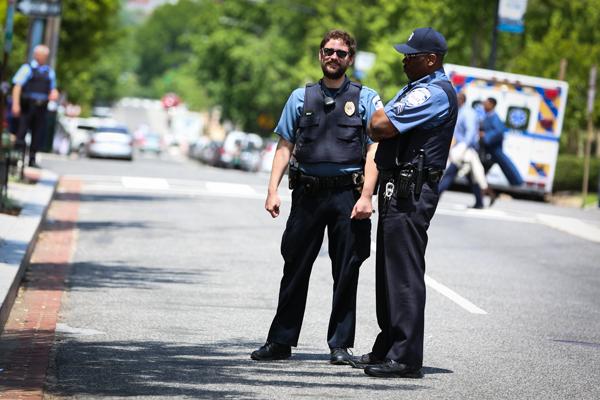The University Police Department recently promoted two officers to detectives – part of the new chief’s hiring strategy.
UPD Chief RaShall Brackney said in an email that professional development within UPD is one of her priorities as chief. Officers and experts said making officers aware that they can be promoted to higher positions can improve relationships among members of the department – especially at GW, where UPD has been hit by six lawsuits from former officers in the past five years.
“Like all other offices and departments at the University, GWPD is committed to maintaining a diverse and inclusive workforce comprised of talented, qualified and hardworking individuals,” Brackney said.
University spokeswoman Maralee Csellar declined to comment on the UPD detective promotions, citing a University policy to not comment on personnel matters. She declined to say when the officers were originally hired and when they were promoted.
One officer, who spoke on the condition of anonymity because UPD officers are not allowed to speak to the media, said Brackney’s strategy is encouraging to officers.
“She seems fair to me,” he said. “It gives everybody an opportunity to go up and grow.”
He said the two officers promoted to detective positions were also the first Latino and Filipino detectives in the department in at least 10 years.
The longtime officer said he appreciates that there are minority detectives because diversity in that particular rank now matches the diversity of GW’s student body.
Brackney said in the fall that one of her goals was to shift the department’s culture to be more inclusive. She began in the position last summer.
Two years ago, officers reported a hostile work environment and an “us vs. them” mentality between officers and supervisors in the department under former UPD Chief Kevin Hay. Those officers described Hay’s management as a “carte blanche system,” in which supervisors dealt with issues in the department instead of the chief handling them.
Five former UPD officers have filed lawsuits claiming racial discrimination in the department. Most recently, former UPD security officer Bernard Nono filed a suit against GW in March, alleging that the University refused to rehire him because of his race after he was fired from the department for being charged with driving while impaired.
Last month, former UPD officer Linda Queen settled her gender discrimination and harassment suit against the University for an undisclosed amount. She filed the lawsuit last year.
Anne-Marie Hakstian, a professor at Salem State University who studies workplace discrimination, said leadership style is a key factor in repairing a department that has been accused of discrimination.
Hakstian, who earned her undergraduate and law degrees from GW, said she thinks Brackney’s policy of promoting current officers to positions higher up in the department could “absolutely” change the culture of the department.
“I think it helps make people think that they are valued, that their contributions are important,” Hakstian said. “It motivates people in the department to strive for excellence for those promotions because they see it’s possible.”
Craig Futterman, a law professor at the University of Chicago who has studied police accountability, said racial diversity within a department can positively affect the internal culture among members of the department.
He said a diverse department makes the officers perform their jobs more effectively within the community and “speaks volumes about the fairness in the department.”
“Even in departments without a history of discrimination, racial diversity, in particular, is a good thing,” he said.
Futterman added that police departments in which the management does not make officers feel respected are not as effective in solving crimes and could negatively affect the officers’ relationships with the community.
“Lack of respect, lack of trust and that kind of hostility breed an ineffective department,” he said.







